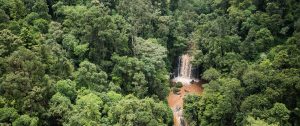Forests make up to a third of the land on earth and they provide habitat to countless species in the world, both animals and human beings. Forests are vital especially when it comes to biodiversity. It is through the existence of various forests that human beings have fresh air that we enjoy breathing. Trees give out oxygen and absorb carbon dioxide, carbon monoxide, sulfur dioxide and Nitrogen dioxide. These are harmful chemicals emitted into the air by pollution from vehicles, industries and other human activities. It has been proven through research, that one mature leafy tree supplies oxygen for about 2 – 10 people. Therefore, forests play a vital role to the environment like protecting us from the health hazard of air pollution.
Over 300 million people live in forests and another 60 million people depend on the forests for their survival in the whole world in terms of food and water while another 1.6 billion people in the world depend directly on the forests for creation of job opportunities through timber and other tree by-products.
In Kenya, there are over 150 public forests growing across various counties that act as water catchment areas, recreational center, ritual sites among others, but the largest forests are:
- Mau Forest
- Mt. Kenya Forest
- Cherangani forest
- Aberdares forest
- Enbotut forest
- Ndoinet forest
- Kakamega forest
- Menengai forest
- Kaptagat forest
- Ngong forest

Despite having all these forests, Kenya has not yet met the minimum forest coverage requirement of 10%. The forest coverage in Kenya is at 3% and this is still endangered. Human activities like tree cutting, charcoal burning, industrialization and urbanization are threatening the existence of these forests. With the adverse effects of climate change, if we don’t take care of the forests then we will experience severe drought, unpredictable rain patterns and more forest fires. Ever since 2022 began, we have witnessed various forest fires in the Aberdares game reserve and the most recent that occurred on 30th September 2022 at the Meru National game reserve.
Article 69 of the constitution says every person has a duty to cooperate with state organs and other persons to protect and conserve the environment and ensure ecologically sustainable development and use of natural resources. In respect to this an act of parliament was enacted, Forest Conservation and Management Act 2016 (FCMA) to make provision for the conservation and management of public, community and private forests and all other forest areas that require protection. This Act outlines the rules and how forests should be used, and to ensure that these forest laws are enforced, the FCMA established the Kenya Forest Service as the body mandated with the power to manage and conserve the forests.
This act of parliament classifies forests into 3 categories; Public forests, community forests and private forests. It gives administrative powers to the Kenya Forest Service to manage public forests by implementing forest management plans and issuing licenses and permits for use of forest resources and capacity building for the county government in forestry. Through the Kenya Forest Service, anyone found committing prohibited activities in the forest like cutting trees, grazing, possessing chain saws, logging tools and smoking will have committed a crime liable upon conviction of a fine not exceeding one hundred thousand shillings and a fine or imprisonment not exceeding 6 months or both. Any person who wilfully or maliciously sets fire to any public, provisional, community or private forest commits an offense and is liable on conviction to a fine not exceeding one hundred thousand shillings or to imprisonment for a term not less than one year, or to both such fine and imprisonment.
Let’s be cognizant of these laws managing the forests to avoid being convicted, not forgetting the benefits that the forests accord us as human beings. It is therefore our collective responsibility to nurture and be mindful of the future generations, who will need a habitable place to call home


